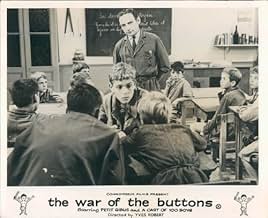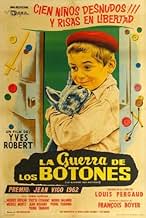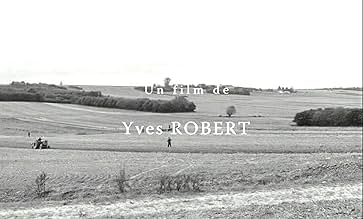La guerre des boutons
- 1962
- 1h 30m
ÉVALUATION IMDb
7,4/10
2,9 k
MA NOTE
Les écoliers de deux villages français se bagarrent. Leur trophée sont les boutons qu'ils arracheront à l'ennemi. Ce combat amènera finalement ces enfants à une amitié éternelle.Les écoliers de deux villages français se bagarrent. Leur trophée sont les boutons qu'ils arracheront à l'ennemi. Ce combat amènera finalement ces enfants à une amitié éternelle.Les écoliers de deux villages français se bagarrent. Leur trophée sont les boutons qu'ils arracheront à l'ennemi. Ce combat amènera finalement ces enfants à une amitié éternelle.
- Director
- Writers
- Stars
- Prix
- 1 victoire et 1 nomination au total
Gérard Aubry
- Un enfant de la bande à Lebrac
- (uncredited)
François Bazinsky
- Un enfant de la bande à Lebrac
- (uncredited)
Christophe Bourseiller
- Gaston
- (uncredited)
François Boyer
- The priest
- (uncredited)
Avis en vedette
"La guerre des boutons" is based on the same title book by Louis Pergaud, which was published in 1912 - 3 years before its author was killed in action from friendly fire during World War I.
The book and its story, although it can be considered lighthearted and humorous, it is a dark manifestation about the stupidity and the futility of war.
Watching this film, almost 30 years after I firstly read the book (on a Boy Scout summer camp), I remembered not only the joyfulness and the innocence of my own childhood but also themes, points and conflicts from the book, that I couldn't fully perceive them as a child while I was reading it, such as leadership, friendship, camaraderie, tolerance, belonging versus violence, abuse, hating, bullying.
This 1962 film was a nostalgic trip to those years and a fine adaptation of the book.
The book and its story, although it can be considered lighthearted and humorous, it is a dark manifestation about the stupidity and the futility of war.
Watching this film, almost 30 years after I firstly read the book (on a Boy Scout summer camp), I remembered not only the joyfulness and the innocence of my own childhood but also themes, points and conflicts from the book, that I couldn't fully perceive them as a child while I was reading it, such as leadership, friendship, camaraderie, tolerance, belonging versus violence, abuse, hating, bullying.
This 1962 film was a nostalgic trip to those years and a fine adaptation of the book.
10Zzaz82
I used to watch this film when I was little. My sister and I actually destroyed the tape because of two much use. Some may say that it's only for children, but it's also an obvious and delightful allegory of the two World Wars. Of course, if you're not fluent in French, it doesn't really worth watching it, because everything is in the lines. It's a wonderful tribute to French people, French countryside life, French nation in general. The children are giving great performances, being touching, cute and above all realistic!!! Just watch it and enjoy! Vive la France!
10elfqueen
The war of the buttons is one of those films that warms the cockles even at a tender age (where such nostalgic sentimentality like cocklewarming is not even a concept yet). The artful description of human nature at its early stages, the heartache of being young, the struggle of empowering onself and of feeling powerless in a world dominated by grown-up violence and/or indifference is so tender, so enchanting that it should be compulsory on school curricula, at least for students of French. Seeing this film makes me yearn for the French countryside, it makes me laugh, it makes me happy, it makes me want to be child and to have a child of my own. And it also moves me to tears, and makes me remember the agonies of childhood. In short, this film is true art in the old philosophical sense: it produces emotion, true emotion, it depicts beauty and it involves its audience in thorough katharsis. A gem.
Rural France fascinates the French, and to those in the main cities like Paris, Marseille and Lyon it is regarded as that ' other place ' where people behave very differently. Crudely put they are either simpletons or people of the earth representing the true nature of life. This film tends towards the former attitude but it is a somewhat ' gentle ' attack against stupidity and vulgarity by concentrating on the children of two villages who go to ' war ' against each other. They of course represent the grown-ups around them who are often either drunk or slightly violent in their approach to each other. It is fun to watch as both sides take ' prisoners ' and ' torture ' them by tearing off all the bottons on their clothes, and so we have in one scene the laughable situation of a battle scene in the nude. As the children imitate their elders by using swear words they barely understand this all appears vaguely shocking, especially to the West Germans who cut it, and the prudish English giving it an ' X ' certificate. That just shows how two countries can be as backward as the two opposing village children. As for the film itself it is well filmed and the director Yves Robert speeds the whole absurdity along with zest. Personally I got a bit bored with the relentless and overbearing music, and the sheer noise of the whole thing, and a feeling of monotony ( the enemy of all cinema ) set in. No spoilers but the ending is rather moving and the last line of the film painfully relevant to the ( partial ) side the film is on. It also errs on the side of sentimentality which grated on me, especially concerning one of the smaller children, but taking all things into consideration it is an oddity worth seeing.
This unforgettable movie about poor, rural French kids who battle each other as representatives for the "republic" or for the "monarchy" in the woods after school. The loser has his buttons knifed off by the winner; since the loser has only 1 pair of trousers he must ask his mama to sew on his buttons.... This "simple" outcome has stuck with d me for 20 years--this great simple film that explores how children unwittingly play out their parents' point of view and how that affects their developing identity. It is wondrously un-American: it's not about individuality triumphing over; it is a view of a world that America has never filmed or explored: one where poor people have character but are condemned to repeat unwinnable battles of the past.
Le saviez-vous
- AnecdotesNone of the child actors in this movie are listed in the credits.
- Autres versionsWest German re-release (1984) was cut by ca. 6 minutes to secure a "Not under 6" rating. This re-release version was used for all subsequent home video releases. The uncut version was released as a bonus feature on the 2005 DVD release (with the missing scenes in French with German subtitles, despite the fact that the complete film was dubbed in 1962).
- ConnexionsReferenced in Les échos du cinéma: Episode #1.32 (1961)
Meilleurs choix
Connectez-vous pour évaluer et surveiller les recommandations personnalisées
- How long is War of the Buttons?Propulsé par Alexa
Détails
- Date de sortie
- Pays d’origine
- Langue
- Aussi connu sous le nom de
- The War of the Buttons
- Lieux de tournage
- Armenonville, Bailleau-Armenonville, Eure-et-Loir, France(Longeverne town: main street and school)
- société de production
- Consultez plus de crédits d'entreprise sur IMDbPro
- Durée1 heure 30 minutes
- Couleur
- Mixage
- Rapport de forme
- 1.66 : 1
Contribuer à cette page
Suggérer une modification ou ajouter du contenu manquant

Lacune principale
By what name was La guerre des boutons (1962) officially released in India in English?
Répondre




























